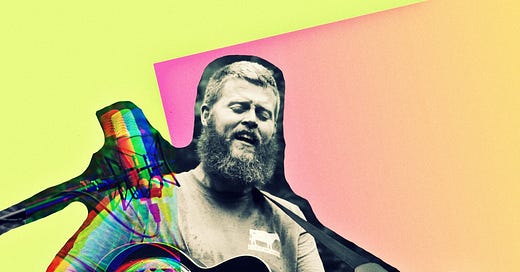There is no shortage of words commonly used to describe art. A novel can be provocative, satirical, or cathartic. A painting can be baroque, avant-garde, or monochromatic. A movie can be graphic, suspenseful, or picaresque.
There’s currently a song taking over the internet. Of all the words available to describe a modern singer-songwriter’s performance, there are two that keep coming up: raw and authentic.
The song is Rich Men North of Richmond by the previously unknown artist Oliver Anthony. It’s a dude in the woods with a guitar, a mic, and a few dogs laying in the grass beside him. He’s yell-singing about how it’s hard to get by when you’re doomed to work long hours on shit wages. It’s pretty damn raw. The authenticity bleeds.
The song has been read by some as a right-wing anthem. But I don’t think that’s correct at all. Here’s the take that, in my view, nails it:
The main reason this song resonates with so many people isn’t political. It’s because the song is raw and authentic. We are suffocated by artificiality. Everything around us is fake. A guy in the woods pouring his heart over his guitar is real. – Matt Walsh.
Matt Walsh says a lot of inflammatory things, but he’s dead-on here. As he says: ignore the politics. No doubt there’s plenty to talk about in terms of politics, but 1) that’s not my interest in this piece, and 2) I think Walsh is generally correct that politics take a back seat for why the song resonates.
Even as someone who spends a lot of time thinking and writing about artificiality, digital spaces, and decadence, I’ll gladly admit that no other artistic qualities can beat rawness and authenticity. I don’t know if we’re necessarily “suffocated by artificially,” as Walsh claims, but when a piece of media bursts onto the national stage stripped of artifice, pretension, and over-production, it cuts deeper than anything else.
You can tell how powerful rawness is as an artistic quality when you notice how hard big-budget films and over-produced records try to manufacture it. For example, in the blockbuster film Oppenheimer, the moment the bomb is tested, the dramatic music (for the first time) stops; time slows down from zippy movie-time to real-life time; we see close-ups of faces with eyes blinking, breath stopping. For just about the only time in the entire three-hour film, the moment comes off as real. And it’s so incredibly well done that—even in the context of a multi-million-dollar Christopher Nolan film—it feels decisively raw, with every actor on screen uncharacteristically vulnerable and human.
It doesn’t matter how technologically advanced we become. There will always be an appetite for art that drops all pretensions and strips down to a t-shirt and jeans in the woods. Major corporations will try to exploit this, and sometimes to amazing effect. In this respect, it’s easy to predict when Zuckerberg’s metaverse will take off: exactly when the technology enables authentic humanness to emerge from the pixels.
But still, nothing will ever beat the real thing. With his acoustic guitar and auto-tune-free vocals, the poor man south of Richmond gets it. (Unless of course the song is a clever psy-op, in which case, sigh, shrug emoji, lmao.)




